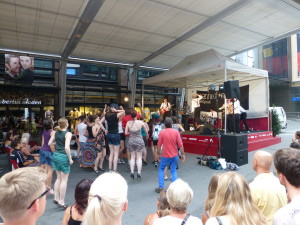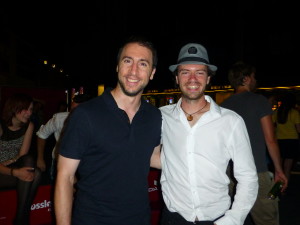I have been away for a bit on vacation, hiking the spectacular Dolomite Mountains of northern Italy and seeing views like that in the above photo.
(Not bad, huh?)
Of course, as apparently is my penchant when I go away, I came back with great inspiration for a blog entry.
And, much like the last time, the inspiration came from an unlikely source. On my last trip I was inspired by an article in an in-flight magazine. This time, it came from an Austrian funk band.
This band.
After the hike, my travel buddy and I stopped for a day in Innsbruck, Austria, a vibrant city whose Old Town blends ornate architecture with youthful verve. Part of that verve, during the summer anyway, comes from a series of outdoor concerts such as this one, which I passed on the way to dinner.
By “passed”, I must admit, I mean “stopped at for 30 minutes”.
The concert was an improbable blast — a local band called MadeByUs, getting the party started with their unique brand of music. This brand, by the way, is described on the band’s web site as such: “The nine-member funk band-succeeds madebyus for 10 years to bring their motivational energy to dance the people. happymusic is probably the best name for the mix of funk, soul, disco and hip hop, with which madebyus presented on stage.”
If that sentence seems a bit grammatically challenged, you should know it has been translated by Google Translate from German.
But here is what I found notable during the concert: most of their songs — and all of their between-song banter with the audience — was in English.
At the time, I did little with that observation other than forget about it. But later that night, on the way back from dinner, my friend and I passed the venue again. The concert was over, but the band was sitting on the stage, chatting with what seemed to be a handful of fawning admirers.
I had to introduce myself.
And so I went up to the lead singer, whose name I still do not know, and said hello. He appreciated my flattering words about the concert, which I truly had enjoyed. And then, continuing the conversation, I broke out that observational nugget.
“I noticed,” I said, “you sing all your songs in English. But you speak German first, right?”
“That’s right,” he said.
“So why don’t you write your lyrics in German, or talk to the crowd in German?”
He paused for a few seconds, seemingly as if he had never been asked this question and was genuinely thinking about it.
And then he said something that warmed my heart.
“Well,” he said, “there’s just something about the English language. It’s so musical and melodic. It just sounds better.”
(If this isn’t the face of profound musical thought, who is? Not me, mind you; the lead singer …)
Clearly satisfied by that revelation, I said farewell and continued onward with my travels. But I kept thinking about his answer.
First, I wondered, is he right? I had never really considered English to be a particularly melodic language. When people think of romance languages, they think first of Spanish, French, Italian, and even Latin. Clearly, as in the case of lead singer, people tend not to think of German that way, but does English carry more melodic weight than the others?
I do not have an answer to that. And certainly, when it comes to romantic lifestyles, the Europeans seem to have us beat in many ways. After all, this was my lunchtime view along the Dolomites:
But the more I thought, the more I felt a certain pride in my native language. And then I thought about my favorite storytellers, the ones who I admired growing up and who energized me as both an aspiring journalist and a plain old member of the audience.
I remembered listening as a teenager to the great hockey announcer Mike Emrick. I marveled at his seemingly endless vocabulary, which recently received its proper due online with this great video: a mash-up of every time, in one game, Emrick used a different synonym for “pass”.
I reminisced about reading the work of Sports Illustrated long-form writer Gary Smith, who engaged me as a reader on so many levels but stood out partially for his tremendous command of the language. Smith uses English as a weapon — one of several ways to lure a reader into his often complicated, dense, and powerful stories.
I also thought one of my favorite current TV news writers, Boyd Huppert, and how he rarely wastes a word in his poignant pieces.
Perhaps, I realized, I have been taking my own language for granted. I like to think I already exhibit great care for language and wordplay in my own stories, but maybe I never fully appreciated its power.
Or maybe, more accurately, I never fully took pride in its melody.
So here’s to the beauty of the English language … even if I needed an Austrian funk band to remind me of it.
====
FOLLOW THE TELLING THE STORY BLOG ON TWITTER!
SUBSCRIBE TO THE TELLING THE STORY PODCAST ON ITUNES!
====
Matt Pearl is the author of the Telling the Story blog and podcast. Feel free to comment below or e-mail Matt at matt@tellingthestoryblog.com.




I am love your observation stylings.
You actually make it appear so easy along with your presentation but I to find this matter to be actually one thing which I believe I’d never understand. It sort of feels too complex and extremely large for me. I am looking forward for your next publish, I’ll try to get the hang of it!